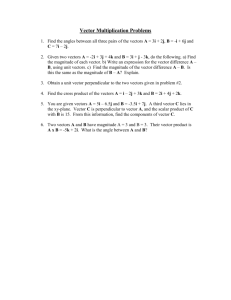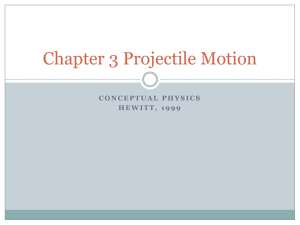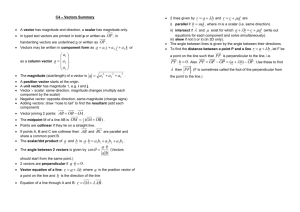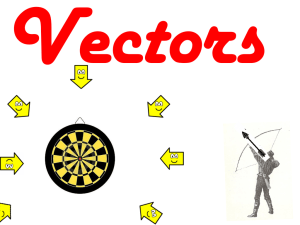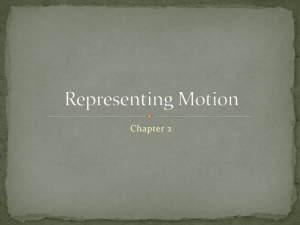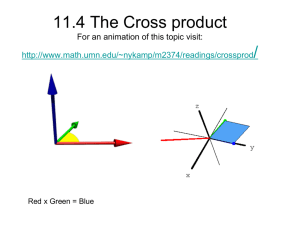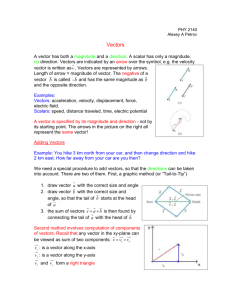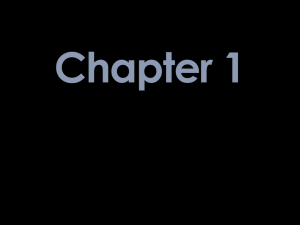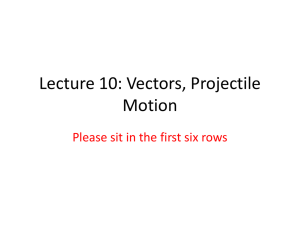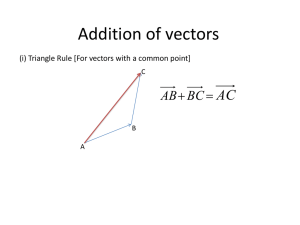Lectures 7, 8, 9
advertisement
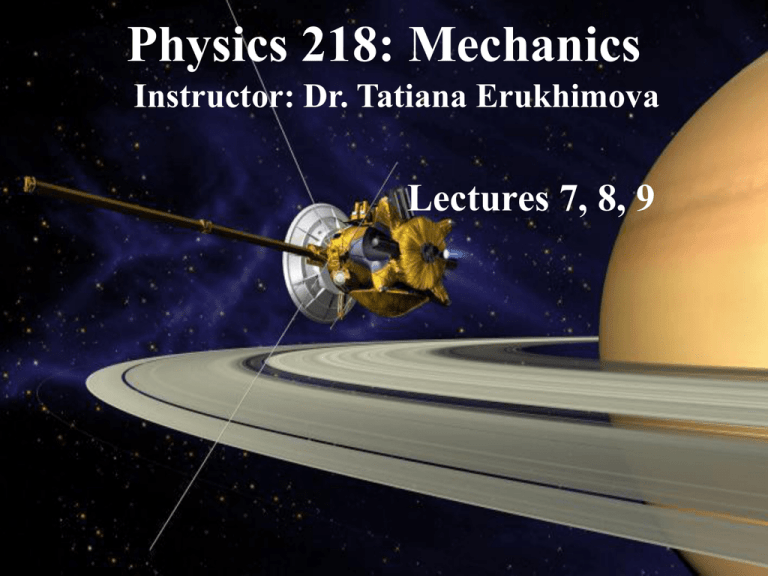
Physics 218: Mechanics Instructor: Dr. Tatiana Erukhimova Lectures 7, 8, 9 Overview of Today’s Class •Hw Quiz •Vectors You want to measure the height of a building. You stand 2m away from a 3m pole and see that it’s “in line” with the top of the building. You measure 16 m from the pole to the building. What is the height of the building? 16 m Adding Vectors by Components 1. Draw a diagram 2. Choose x and y axes. Choose them in a way that make your work easier. (E.g. choose one axis along the direction of one of the vectors so that the vector will have only one component). 3. Resolve each vector in x and y components 4. Calculate each component using sine and cosine. Be careful with signs: any component that points along the negative x or y axis gets a negative sign. 5. Add the x components together to get the x component of the resultant. Similar for y: Vx=V1x+V2x+… Vy=V1y+V2y+… 6. If you want to know the magnitude and direction of the resultant vector, V V V 2 x 2 y tan Vy Vx CRAYFISH, SWAN, AND PIKE (Translation of I. Krylov's fable) Let crayfish, swan and pike Draw heavy loaded cart, Each being just a part Of harness they dislike. They try a lot, and everyone Starts pulling it with zeal; The problem is that each of them With his path wants to deal! The swan makes upward for a cloud, The crayfish falls behind; The pike dives sharply in the deep, And cart moves not from site. The moral of the verse is that Accordance should prevail Amid the people who have plans To work but not in vain. Russian fable: Swan, Crawfish, and Pike Fs Lake Despite their huge effort the box does not move! River Fp Fc Find Fs and Fc if Fp, θ, and are given Quiz and b 7i 3 j : a) Find the components of the vector r a b Given two vectors, a 4i 6 j b) Find the magnitude of makes with the x axis. r and the tangent of the angle r Given two vectors, A 4i 3 j and B 5i 2 j a) find the magnitude of each vector b) Write an expression for the vector difference A B using unit vectors a) Express the vectors F1, F2, and F in terms of their components. 3 y F2 2 3 F3 x 1 F1 F4 , b) Find the components of the fourth force, that should be added for the object to be in static equilibrium. A cannon at the origin points up at an angle θ with the x axis. A shell is fired which leaves the barrel with a velocity of magnitude Vm. a) When does the shell reach its maximum height? b)What is the maximum height? c) What is the range (horizontal distance)? d)What is the velocity of the shell when it hits the ground? A can drops from a magnet just when a bullet is shot from a gun: Find the angle that the gun must be aimed at to hit the can. y vi H θ D x A physics professor did daredevil stunts in his spare time. His last stunt was an attempt to jump across a river on a motorcycle. The takeoff ramp was inclined at 53.00, the river was 40.0 m wide, and the far bank was 15.0 m lower than the top of the ramp. The river itself was 100 m below the ramp. You can ignore air resistance. a) What should his speed have been at the top of the ramp to have just made it to the edge of the far bank? b) If his speed was only half the value found in (a), where did he land? A faulty model rocket moves in the xy-plane (the positive ydirection is vertically upward). The rocket’s acceleration has components ax(t)=t2 and ay(t)=-t, where =2.50 m/s4, =9.00 m/s2, and =1.40 m/s3. At t=0 the rocket is at the origin and has velocity v0 v0 x i v0 y j with v0x 1.00 m / s and v0 y 7.00 m / s. a) Calculate the velocity and position vectors as functions of time. b) What is the maximum height reached by the rocket? c) What is the horizontal displacement of the rocket when it returns to y=0? Have a great day! Reading: Chapters 3,4

